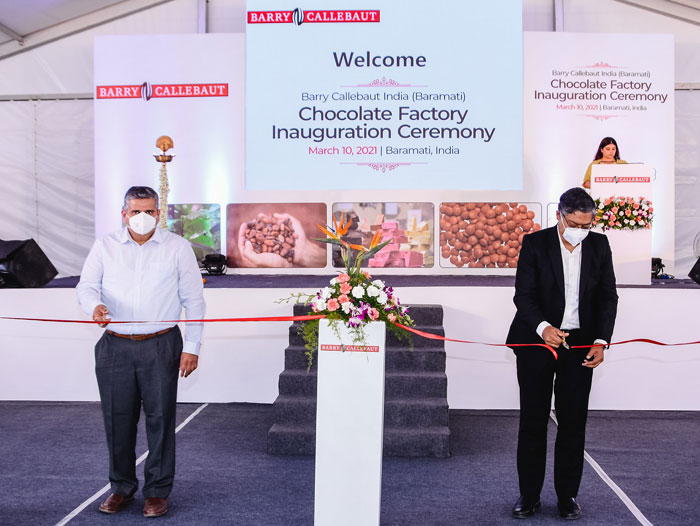Barry Callebaut Announces Opening of its New Chocolate Factory
March 12, 2021 | 4 min to read

Barry Callebaut’s new factory is located about 250 km south-east of Mumbai and represents its biggest investment in India to date. The new chocolate factory and warehouse include an R&D lab, and assembly lines capable of manufacturing chocolate and compound in different delivery formats, catering to the various needs of its customers — international food manufacturers, local confectioneries and semi-industrial bakers and patisseries.
Antoine de Saint-Affrique, CEO of the Barry Callebaut Group, said: “The new factory in Baramati celebrates India’s rich chocolate heritage and marks a new milestone in Barry Callebaut’s history of direct investment in India. It underlines our commitment to the world’s second most populous country, a confectionery market with great potential. In line with our ‘smart growth’ strategy, the new factory expands our local production footprint in the region.”
Once fully operational, the 20,000 square meter facility will employ between 100 to 120 people, thus creating new skilled jobs, mainly in engineering and production. The new plant also features a variety of energy and water-saving solutions in the areas of infrastructure, production equipment and the overall facility energy control system.
Finest “Make in India” chocolates[1]
In addition to the new chocolate factory in Baramati, Barry Callebaut’s production network in India includes another chocolate factory in Pune (Maharashtra) and a specialties and decorations factory, also located in Baramati. Together with its existing CHOCOLATE ACADEMY™ Center and sales office in Mumbai, the company is well positioned to expand its work with customers to co-create innovative chocolate for local consumers.
Over the last four years, Barry Callebaut has seen double-digit growth in India, along with an enthusiastic consumer response towards innovative chocolate such as Ruby chocolate. Demand for high-quality chocolate has been rising, which has prompted a concurrent increase in domestic chocolate production.
Dhruva Jyoti Sanyal, Managing Director for Barry Callebaut India, said: “The opening of our new flagship chocolate factory marks an important step forward in advancing our business across more regions of India. This new facility underpins our ability to deliver a broad portfolio of locally produced chocolate products that meet the increasingly diversified needs of consumers in India’s fast-growing chocolate and cocoa market[2].”
The new factory in Baramati provides proximity to local customers. In addition to supplying industrial chocolate to food manufacturers and confectioneries, the factory in Baramati will also produce sustainable chocolate and compound products under the Van Houten Professional brand in the country. Barry Callebaut now offers a wide range of chocolate products in India. This includes specialties and decorations chocolates, which are also produced in Barry Callebaut’s existing factory in Baramati. These steps will help Barry Callebaut to achieve its ambition of manufacturing the finest “Make in India” chocolate.
About Barry Callebaut Group (www.barry-callebaut.com):
With annual sales of about CHF 6.9 billion (EUR 6.4 billion / USD 7.1 billion) in fiscal year 2019/20, the Zurich-based Barry Callebaut Group is the world’s leading manufacturer of high-quality chocolate and cocoa products — from sourcing and processing cocoa beans to producing the finest chocolates, including chocolate fillings, decorations and compounds. The Group runs more than 60 production facilities worldwide and employs a diverse and dedicated global workforce of more than 12,000 people
The Barry Callebaut Group serves the entire food industry, from industrial food manufacturers to artisanal and professional users of chocolate, such as chocolatiers, pastry chefs, bakers, hotels, restaurants or caterers. The global brands catering to the specific needs of these Gourmet customers are Callebaut® and Cacao Barry®, Carma®and the decorations specialist Mona Lisa®.
The Barry Callebaut Group is committed to make sustainable chocolate the norm by 2025 to help ensure future supplies of cocoa and improve farmer livelihoods. It supports the Cocoa Horizons Foundation in its goal to shape a sustainable cocoa and chocolate future.
